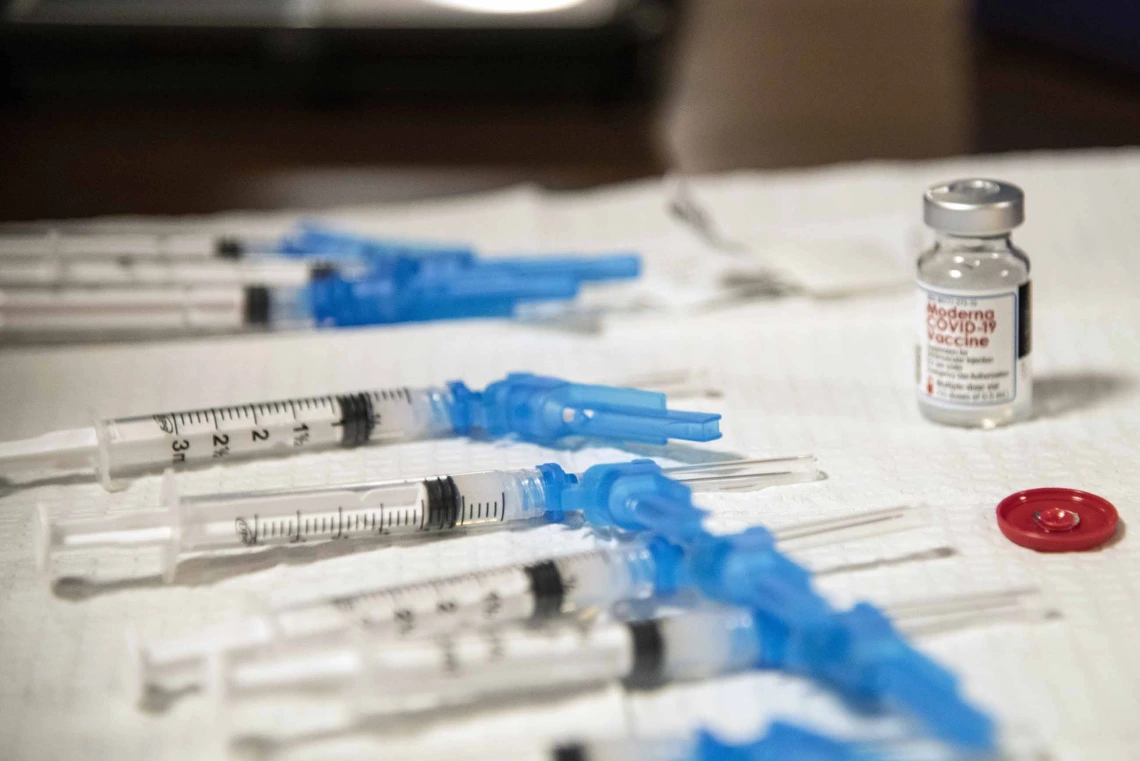Study says original COVID-19 vaccination did not stop immune system from fighting variants
Vaccinated people generated an overall protective immune response to the Delta and Omicron strains of COVID-19, though with slightly fewer antibodies for the mutated parts of the virus.

University of Arizona Health Sciences researchers found that people who received the original COVID-19 vaccine had greater antibody production against the Delta and Omicron variants than those who were unvaccinated.
Photo by Noelle Haro-Gomez, U of A Health Sciences Office of Communications
Prior COVID-19 vaccination did not stop the immune system from mounting a protective response to the Delta and Omicron strains, though new mutation-specific antibody production dipped slightly, according to a study led by researchers at the University of Arizona Health Sciences and published in Nature Immunology.
The paper, “Intrinsic immunogenicity is a major determinant of type-specific responses in post-vaccination SARS-CoV-2 infections,” could inform future vaccine development efforts and help set vaccination and booster strategies.

Deepta Bhattacharya, PhD, is the inaugural executive director of the Center for Advanced Molecular and Immunological Therapies at the University of Arizona Health Sciences.
“What we really wanted to address is this fundamental question of how the immune system adapts when you’re exposed to a virus and then the virus changes – are you able to generate new responses against those new mutations?” said Deepta Bhattacharya, PhD, inaugural executive director of the U of A Health Sciences Center for Advanced Molecular and Immunological Therapies and professor of immunobiology at the U of A College of Medicine – Tucson. “We found that even though new responses to the mutated parts of the virus are down a bit in vaccinated people who get infected, the overall protective response is much, much higher than in those who were unvaccinated when infected.”
The research team examined antibody responses to Delta and Omicron infections in people who were either unvaccinated or vaccinated against the original SARS-CoV-2 virus.
They found that overall antibody production for the Delta and Omicron variants was greater in people who received the original COVID-19 vaccine than in those who were unvaccinated.
The production of Delta-specific antibodies, though, was partially suppressed in people who were previously vaccinated compared with those who were unvaccinated.
“If you got vaccinated against the original virus strain, and then you got a Delta virus infection, you made a ton of protective antibody responses overall, but slightly fewer against the parts of the virus that had mutated compared with people who hadn’t had that vaccine,” Bhattacharya said, noting that in each variant there are pieces of the virus that did not change. The antibodies aimed at those parts, he said, are extremely protective.
The findings indicate that immune changes due to antigenic imprinting – the suppression of the original immune response when faced with a slightly different version of the virus – may be too small to be of functional consequence for SARS-CoV-2.
“What was really interesting is that even people whose very first exposure was to Delta or to Omicron, so there’s no prior immunity at all, were making very poor responses against the mutant parts of the virus.”
Bhattacharya, who is also a member of the university’s BIO5 Institute, said one of the key takeaways from the study is the potential to develop vaccines in different ways to elicit strong immune responses.
If researchers can determine which parts of the virus are causing evasion from the immune system, they could engineer vaccines to make sure that the immune system is effectively seeing the entire virus. That, he says, is an important part of broadening the immune response to include inevitable viral mutations.
Moving forward, Bhattacharya would like to take a closer look at what is causing the suppression of new antibody responses by prior immunity. That information, he says, could be used to develop logical frameworks for when vaccinations and boosters should be administered.
In addition to senior author Bhattacharya, the University of Arizona members of the research team included Michel Worobey, PhD, of the College of Science; Janko Nikolich, MD, PhD, Karen Lutrick, PhD, Kameron Peyton and Jennifer Uhrlaub, of the College of Medicine – Tucson; Branden Lau of the Arizona Genetics Core; Jefferey Burgess, MD, MPH, Katherine Ellingson, PhD, Shawn Beitel and James Romine, PhD, of the Mel and Enid Zuckerman College of Public Health; Bonnie LaFleur, PhD, of the BIO5 Institute and the R. Ken Coit College of Pharmacy; Ryan Sprissler, PhD, of the U of A Health Sciences Center for Advanced Molecular and Immunological Therapies and the BIO5 Institute; and Michael Dake, MD, formerly of U of A Health Sciences. First author Grace Quirk, PhD, received her doctorate from the U of A College of Science and is now a postdoc at Emory University. Other co-authors came from Washington University, the National Center for Immunization and Respiratory Diseases at the Centers for Disease Control and Prevention, St. Luke's Regional Health Care System in Duluth, Minnesota, the University of Miami, Kaiser Permanente Northwest Center for Health Research, Texas A&M University, University of Utah Health, and Abt Associates.
This study was funded in part by the National Institute of Allergy and Infectious Diseases, a division of the National Institutes of Health, under award nos. R01AI099108, R01AI129945 and R01AI157155, and contract nos. 75N93021C00015 and 75N93019C00051, and by the Arizona Board of Regents. Additional funding to the HEROES-RECOVER cohort was supported by the National Center for Immunization and Respiratory Diseases and the Centers for Disease Control and Prevention under contracts 75D30120R68013, 75D30120C08379 and 75D30120C08150.
The content is solely the responsibility of the authors and does not necessarily represent the official views of the National Institutes of Health.
Experts
Deepta Bhattacharya, PhD
Inaugural Executive Director, Center for Advanced Molecular and Immunological Therapies, U of A Health Sciences
Professor, Department of Immunobiology, College of Medicine – Tucson
Professor, Department of Surgery, College of Medicine – Tucson
Member, BIO5 Institute
Member, Comprehensive Cancer Center, U of A Health Sciences
Contact
Stacy Pigott
U of A Health Sciences Office of Communications
520-539-4152, spigott@arizona.edu

